The Great White Bear (35 page)
Read The Great White Bear Online
Authors: Kieran Mulvaney

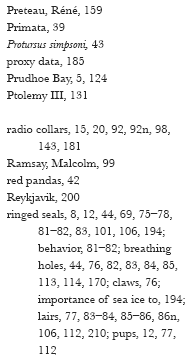
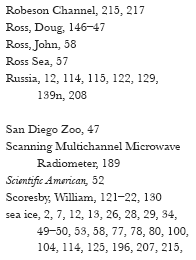
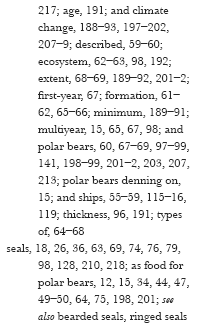
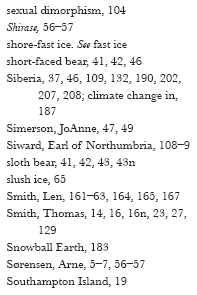
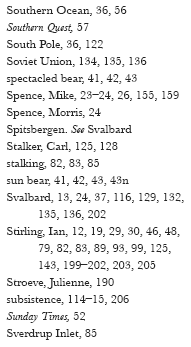
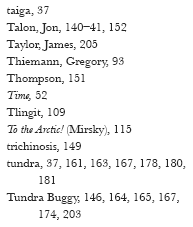
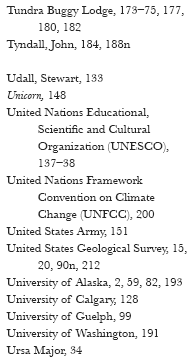
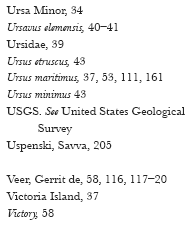
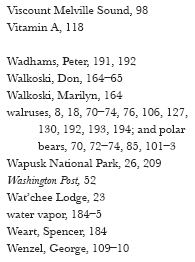
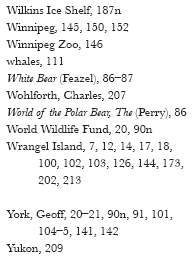
* Smith reports that of all the dens he has studied on Alaska's North Slope, "there has been no ventilation shaft ... none. How they can breathe in there is truly puzzling. I'm convinced a human in there would die. So how do they do it?"
***
* Today, this constellation is recognized primarily by its seven brightest stars, known in Britain as the Plough, and in North America as the Big Dipper.
***
* Or something like that. A 2004 analysis of bear phylogeny concluded that precisely where sloth and sun bears fit into the scheme of things, and when they diverged from the ancestral branch, remains uncertain.
***
* Indeed, mammals generally were larger during the Ice Age. This was the time of, among other species, the giant beaver, the giant sloth, and the Irish elk, the largest deer that ever lived. That said, some doubt has more recently been cast on the accuracy of the assumption of early polar bears' gigantism.
***
* As Lavigne points out, all kerotinized proteinâthat is, hairâprovides an element of UV absorption. "If nothing else, it prevents sunburn," he notes.
***
* An Inuit word for a ringed seal breathing hole, often used in popular terminology.
***
* Most of the time, anyway. When first out of their dens, the bears eat muscle as well as skin, blubber, blood, and organs. At that time of year, notes Brendan Kelly, "I often find only the tympanic bullae [ear bones] left at a kill site." As the bears fatten, they become more selective and later in the summer take only the blubber.
***
* For individual bears on a short-term basis, anyway. The amount and availability of the extra food source are not enough to provide any kind of boost on a population level. Plus, as Geoff York, formerly of the USGS and now with the World Wildlife Fund, points out, "it is essentially a subsistence 'dump' scenario, not sustainable or natural, and will end badly for people and bears alike if allowed to persist as currently practiced in Kaktovik." For this reason, the larger settlement of Barrow has a program to dispose of the waste from its fall whaling season and also actively seeks to keep bears out of the community.
***
* Radio collars are fitted only on female bears. The thick necks of males are wider than the bears' heads, creating a kind of funnel shape from shoulders to nose, meaning any collars would slide right off. The necks of females are narrower, and as a result, collars can remain affixed until, at a preprogrammed time, they unlock and fall off. However, new developments are making it possible to monitor males' wanderings with small radio receivers that attach to the bears' ears.
***
* In this adjective, perhaps, we can deduce an explanation for the bear's extraordinarily aggressive behavior.
***
* Cetaceansâthat is, whales, dolphins, and porpoises.
***
* However, although sport hunting is vastly reduced, it has not been entirely eliminated, as Canadian Inuit are permitted to sell some of their subsistence quota to nonNative hunters. By 2006, the portion of the quota from sport hunting had increased from 1 to 15 percent since the 1970s, although it seems likely to decrease following restrictions placed by the U.S. government on the import of polar bear products into that country. There is some concern also over increases in some Inuit quotas and catches in Canada and Greenland, particularly given that the species is facing additional threats from, primarily, climate change. Additionally, although polar bear hunting has long been banned in Russia, illegal hunts are believed to be taking place on a scale of great concern to environmentalists and scientists.
***
* Theoretically, there are a number of ways to distinguish males from females, at least when mature. Males, as previously noted, have necks that are wider than their heads, creating a funnel shape from shoulders to face, whereas the heads of females are slightly larger than their necks. Males tend to carry scars about their faces, the results of innumerable bouts of playful sparring and more serious battling for mates. And males are simply heftier. But it isn't always quite so easy to place that theory into practice. Partly because of the amount of fur in the way, even close examination of the genitalia of an anesthetized bear isn't always completely reliable. A 1999 study showed that gender was incorrectly identified in 19 of 139 bears killed by Native hunters in Alaska. But there are times, such as this occasion, when a bear is so obviously massive that it is clearly a mature male.